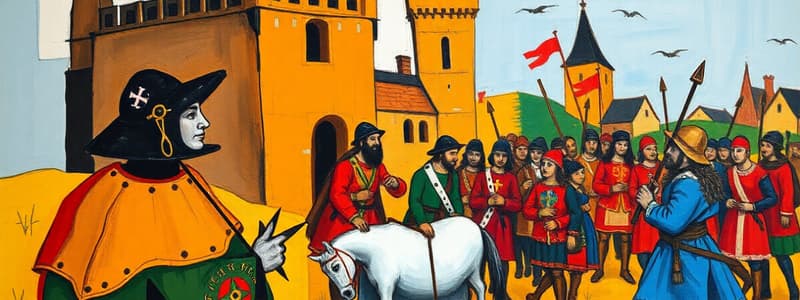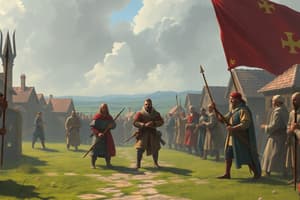Podcast
Questions and Answers
What event was sparked by the hardships faced by peasants after the Black Death?
What event was sparked by the hardships faced by peasants after the Black Death?
- The Hundred Years' War
- The War of the Roses
- The Peasants' Revolt of 1381 (correct)
- The English Civil War
What was the main reason for the anger of peasants towards the Poll Tax?
What was the main reason for the anger of peasants towards the Poll Tax?
- It was implemented without their consent.
- It unfairly taxed the poorer population the same as the rich. (correct)
- Only the wealthy had to pay it.
- It was too high for everyone.
Who was the leader of the Peasants' Revolt of 1381?
Who was the leader of the Peasants' Revolt of 1381?
- Wat Tyler (correct)
- King Edward III
- John Ball
- Richard II
What was a significant outcome of the Peasants' Revolt despite its failure?
What was a significant outcome of the Peasants' Revolt despite its failure?
What did English kings claim as a justification for the Hundred Years' War?
What did English kings claim as a justification for the Hundred Years' War?
What weapon contributed significantly to English victories during the Hundred Years' War?
What weapon contributed significantly to English victories during the Hundred Years' War?
What impact did the Hundred Years' War have on English identity?
What impact did the Hundred Years' War have on English identity?
After the Black Death, which societal change did the Peasants' Revolt of 1381 aim to address?
After the Black Death, which societal change did the Peasants' Revolt of 1381 aim to address?
What was one result of Wat Tyler's death during the Peasants' Revolt?
What was one result of Wat Tyler's death during the Peasants' Revolt?
During the Hundred Years' War, which language began to gain prominence in England?
During the Hundred Years' War, which language began to gain prominence in England?
What was one significant effect of the Hundred Years' War on English literature?
What was one significant effect of the Hundred Years' War on English literature?
Why is Geoffrey Chaucer often referred to as the 'Father of English Literature'?
Why is Geoffrey Chaucer often referred to as the 'Father of English Literature'?
What unique characteristic did Chaucer include in 'The Canterbury Tales'?
What unique characteristic did Chaucer include in 'The Canterbury Tales'?
What was John Wycliffe's primary goal regarding the Bible?
What was John Wycliffe's primary goal regarding the Bible?
What was the primary belief of the Lollards led by Wycliffe?
What was the primary belief of the Lollards led by Wycliffe?
How did the Age of Chaucer (1350-1400) contribute to the English language?
How did the Age of Chaucer (1350-1400) contribute to the English language?
What new form of English began to emerge during Chaucer's time?
What new form of English began to emerge during Chaucer's time?
What type of stories did Chaucer include in 'The Canterbury Tales'?
What type of stories did Chaucer include in 'The Canterbury Tales'?
What role did Chaucer have in society?
What role did Chaucer have in society?
How did the Hundred Years' War influence English identity?
How did the Hundred Years' War influence English identity?
Flashcards
Who is the 'Father of English Literature'?
Who is the 'Father of English Literature'?
Geoffrey Chaucer is known as the 'Father of English Literature' for his significant contribution to establishing English as a literary language.
What made 'The Canterbury Tales' unique?
What made 'The Canterbury Tales' unique?
Chaucer's 'The Canterbury Tales' was influential because it was written in English, rather than Latin or French, and featured diverse characters from all walks of life.
How did Chaucer's travels influence his writing?
How did Chaucer's travels influence his writing?
Chaucer's extensive travels throughout Europe, particularly Italy and France, exposed him to new literary styles which he incorporated into his own writing.
What was John Wycliffe's main goal?
What was John Wycliffe's main goal?
Signup and view all the flashcards
Who were the Lollards?
Who were the Lollards?
Signup and view all the flashcards
How did the Lollard movement impact the use of English?
How did the Lollard movement impact the use of English?
Signup and view all the flashcards
How did the Hundred Years' War affect the English language?
How did the Hundred Years' War affect the English language?
Signup and view all the flashcards
What was the status of English after the Hundred Years' War?
What was the status of English after the Hundred Years' War?
Signup and view all the flashcards
What is Middle English?
What is Middle English?
Signup and view all the flashcards
Why was Middle English important for literature?
Why was Middle English important for literature?
Signup and view all the flashcards
Peasants' Revolt (1381)
Peasants' Revolt (1381)
Signup and view all the flashcards
Poll Tax (1381)
Poll Tax (1381)
Signup and view all the flashcards
The Hundred Years' War
The Hundred Years' War
Signup and view all the flashcards
Longbow
Longbow
Signup and view all the flashcards
Wat Tyler
Wat Tyler
Signup and view all the flashcards
Black Death
Black Death
Signup and view all the flashcards
Age of Chaucer (1350-1400)
Age of Chaucer (1350-1400)
Signup and view all the flashcards
Slavery
Slavery
Signup and view all the flashcards
Society and Fairness
Society and Fairness
Signup and view all the flashcards
Standing Up to Rulers
Standing Up to Rulers
Signup and view all the flashcards
Study Notes
The Age of Chaucer (1350-1400)
- The Peasants' Revolt of 1381: A significant uprising of common people due to harsh conditions for peasants after the Black Death.
- A new tax, the Poll Tax, impacted peasants disproportionately.
- Led by Wat Tyler, peasants protested demanding an end to the Poll Tax, slavery, and fair treatment.
- The revolt ended with Wat Tyler's death, arrests, and executions of many leaders.
- It highlighted the power of common people to challenge rulers and fostered change in societal perspectives.
The Hundred Years' War (1337-1453)
- A series of wars between England and France, lasting over one hundred years.
- Motivated by English kings' claims to French lands & crown.
- English victories; showcased pride and development of English identity and culture.
- Longbows were key weaponry.
- Shift in language use; English replaced French in everyday speech.
- Fueled a desire for English literature, inspiring works like Geoffrey Chaucer's.
- Although England eventually lost, the 100 years' war cemented English identity.
Geoffrey Chaucer
- Lived from around 1340 to 1400.
- A civil servant for the king, including diplomatic missions to Europe.
- Significant for writing in English rather than Latin or French.
- His most famous work, "The Canterbury Tales", features stories from various social classes traveling to Canterbury.
- This was a collection of diverse stories presented in English.
- Considered the "Father of English Literature" for demonstrating the power of English literature.
John Wycliffe and the Lollards
- John Wycliffe, a priest and teacher, sought to reform the Church in the late 1300s.
- Challenged the Church's practice of keeping the Bible only in Latin.
- Translated the Bible into English, making it accessible to ordinary people.
- His followers, known as Lollards, preached using the English Bible.
- Lollards emphasized the Church's wealth and power and criticized its practices.
- This translation encouraged broader access to literature, and ordinary people wanted to understand texts for themselves.
- This led to religious and literary changes in English literature.
Development of English in the Age of Chaucer
- By 1400, English was the primary language for official and public life.
- This contrasted with the French dominance after the Norman Conquest (1066).
- The Hundred Years' War played a role in the language shift.
- English literature embraced blended traditions from both English and European traditions, paving the way for the powerful literary tool we know today.
- Middle English emerged (a mix of Old English and French).
- Writers demonstrated that English could be used for great literature, and the English language continued to evolve.
Studying That Suits You
Use AI to generate personalized quizzes and flashcards to suit your learning preferences.



